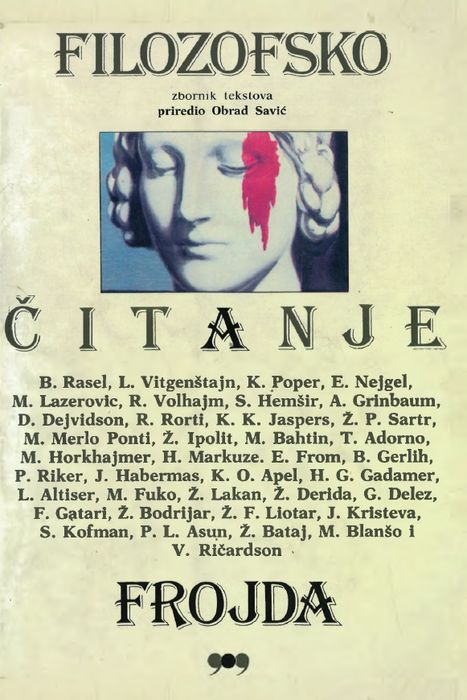










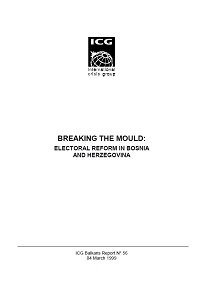
Electoral reform is on the agenda this year in Bosnia and Herzegovina. For too long the country has been ruled by leaders who draw support from only one of the three main ethnic groups. These leaders have been unable to co-operate on even the simplest matters, inhibiting the implementation of the Dayton Peace Agreement (DPA) and forcing the international community to micromanage the country. Electoral reform offers one promising way to allow Bosnians to choose less confrontational leaders, and so start to accept responsibility for their own future.
More...
Milosevic is giving every indication that he intends to stay in power well beyond 2001 as an elder statesman, and to govern by controlling the instruments of force. His intention appears to be that he will preside over a military dictatorship bereft of all opposition; he may even be willing to sacrifice territory, content to rule over the Pasalik (from Ottoman or Turkish administration, meaning a small administrative district or region) of Belgrade1. Any comprehensive analysis of opposition to the Milosevic regime must address his dealings not just with political parties but also with institutions and key individuals.
More...
Keywords: Rambouillet;
The Kosovo peace talks, held at Rambouillet (France) under the auspices of the sixnation Contact Group, have been suspended until 15 March 1999 after a provisional agreement was reached on granting substantial autonomy for Kosovo. However, neither the Kosovo Albanians nor Serbian delegates have yet signed the draft peace accord, which calls for a NATO peacekeeping mission in Kosovo, and in which the "final status" issue has been deliberately fudged. The immense complexities of the Kosovo question were dramatically illustrated at Rambouillet by the last-minute refusal of the Albanian delegation to sign the accord, due to pressure from a hardline faction of the Kosovo Liberation Army (KLA) which refused to attend the talks.
More...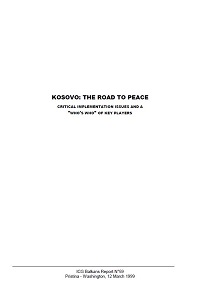
While last spring saw conflict erupt in Kosovo's central Drenica region when Serbian security forces attacked and killed residents of the villages of Prekaz and Likoshan, this spring brings the possibility of peace. The proposed deployment of a 28,000-strong international force for Kosovo will dramatically and immediately halt the sporadic low-intensity battles between Serbian security forces and ethnic Albanian rebels that have displaced 300,000 people. This peace will allow refugees to return to their homes, and provide the day-to-day sense of security on the ground that will enable Kosovo's transition to self-government.
More...
This latest ICG report on Macedonia was written during March, as the new humanitarian catastrophe in neighbouring Kosovo unfolded and reached a new scale. Because of the recent events in Kosovo and the region at large, parts of this report have been overtaken by new developments. In particular, this concerns issues relating to the amount of aid reaching Macedonia, actions taken to alleviate the refugee situation in Macedonia and, most importantly, the Government’s ability to deal with the increasing number of refugees. Indeed, events in the last few days may well have reached a point beyond the Government’s capacity to respond. On the whole however, the analysis and conclusions of this report are still valid and still merit consideration despite the fact that local and international attention is now focusing on developments in Kosovo and their effect on neighbouring countries
More...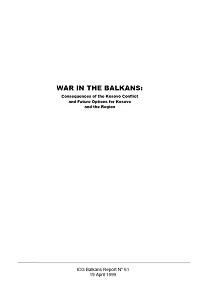
Keywords: NATO Intervention;
NATO’s strategy in the war with Yugoslavia over Kosovo isn’t working. As the Alliance’s bombing campaign enters its fourth week, it is Yugoslav President Slobodan Milosevic who is still winning the political game. Western governments have fallen into a humanitarian trap – concentrating on the hundreds of thousands of refugees expelled from Kosovo while failing to address the appalling human tragedy still going on inside the province. The present paper, prepared by International Crisis Group (ICG) analysts in Belgrade, Skopje, Tirana, Sarajevo, Washington DC, and Brussels, summarises the situation on the ground throughout the Balkans in the wake of recent events and examines the difficult choices facing Western leaders. It concludes with a comprehensive statement of policy recommendations designed to contribute both to a solution to the immediate crisis and to longerterm regional stability.
More...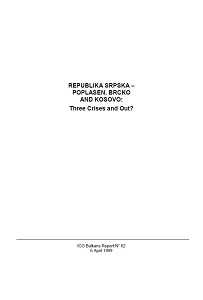
Keywords: Polasen crisis; Brcko decision; Serb Radical Party; Milorad Dodik; Republika Srpska;
The early part of 1999 has been turbulent for Republika Srpska. Political life has been unsettled by three separate and hardly-related crises: the decision of the High Representative to remove from office the RS President Nikola Poplasen; the decision of International Arbitrator Roberts Owen to give the municipality of Brcko neither to RS nor to the Federation but to both as a condominium; and the NATO air-strikes on the Federal Republic of Yugoslavia (FRY). Either of the first two issues alone would have been ordinary daily business in the bad-tempered world of Bosnian politics. The two together could probably have been handled. But RS reactions to NATO action in FRY, coming on top of the excitement already created by previous events, have raised tensions to very high levels. Numerous peaceful demonstrations have turned violent, and international organisations – usually the target of the demonstrations – have withdrawn most of their personnel. There are still elements in RS ready and willing to use violence to promote political objectives, and the current climate offers them fertile soil. The beleaguered authorities in Belgrade have every reason to foster a diversion in Bosnia to give the international community another problem besides Kosovo to worry about. The present moment could be the most dangerous for the Dayton Peace Agreement since it was signed in 1995.
More...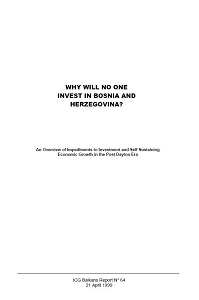
Keywords: Bosnian economy;
The donor countries hoped the governments of Bosnia and Herzegovina would use the promised $ 5.1 Billion post-war reconstruction aid to undertake the structural changes necessary to transition from communism to capitalism. As donor-aid diminished, private investment would replace it, stimulated by structural reforms. Unfortunately, this has not been the case. Indeed, interviews with Bosnian and foreign businessmen show a common reluctance to invest in BiH. The current economic and political structures in all three ethnic sections of BiH maintain the failed communist-era policies that contributed to former Yugoslavia’s economic downturn and eventual break-up. These policies discourage business activity and investment. The continued existence and implementation of these failed economic policies and structures means that donor aid, no matter how wisely targeted or spent, will prove ineffective in creating long-term, sustainable economic development.
More...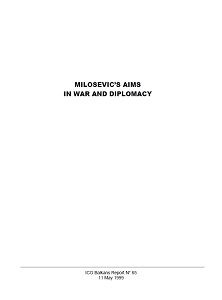
This report, prepared by ICG’s Belgrade-based analyst, looks back on an extraordinary two months of war and diplomacy in the Balkans. It argues that Milosevic, while not actively willing NATO bombing, was prepared for that eventuality3 and examines how he has used it to his advantage. The start of NATO’s air campaign on 24 March 1999 provided Milosevic with the cover to unleash his own ground war within Kosovo. Within hours of the first NATO missiles being fired, Yugoslav forces, including paramilitaries, embarked on the most vicious and extensive campaign of ethnic cleansing seen in Europe since World War II. An estimated 88 percent of the Kosovo population have been driven from their homes, the bulk forced to seek refuge outside of Yugoslavia. For the first three weeks of NATO air strikes, Milosevic sought to shore up his position at home, assuming sweeping war-time powers, refusing to countenance any concessions to NATO’s demands and riding a wave of nationalist resentment directed against the West. During this phase of the conflict, Milosevic strove to emphasise that the Serbs was not alone in the world, holding out the prospect of Serbia’s allies, in particular Russia, intervening militarily to protect the country from attack. Much play was made of remarks by Russian President Boris Yeltsin and members of the Russian legislature that NATO’s action risked triggering a new world war.
More...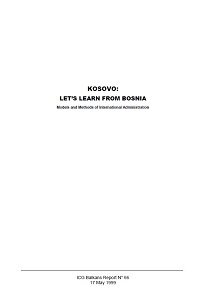
After almost three and a half years working in Bosnia to implement the Dayton Peace Agreement, the international community will soon face the prospect of establishing a presence in Kosovo. The model proposed at Rambouillet was very similar to that set up at Dayton, but the situation now is very different. This report examines the international effort in Bosnia to see whether lessons can be drawn for Kosovo and other possible future international administrations. At Dayton it was assumed that military implementation would be harder than civilian, so the two were kept rigidly separate, and the role allotted to civilian implementation was to give a ‘helping hand’ to the Bosnian authorities, who were assumed to want to co-operate with implementation. The Rambouillet agreement preserved the same division between civilian and military implementation as Dayton. Yet experience in Bosnia has shown that a helping hand has not been enough since the Bosnian parties have not in fact co-operated among themselves or with the internationals. In response, the High Representative in Bosnia has gradually taken on extra powers, but his ability to use them effectively is limited because he still has no force at his disposal to back him up. However many powers he appears to have, he will always face this problem, even if a so-called ‘protectorate’ is established. Currently, influence over aid is his only real power.
More...